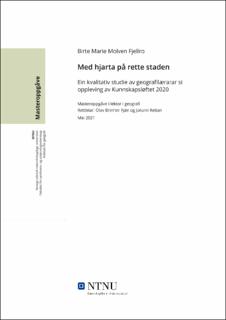| dc.contributor.advisor | Fjær, Olav Bremer | |
| dc.contributor.advisor | Reitan, Jorunn | |
| dc.contributor.author | Fjellro, Birte Marie Molven | |
| dc.date.accessioned | 2021-09-28T17:56:24Z | |
| dc.date.available | 2021-09-28T17:56:24Z | |
| dc.date.issued | 2021 | |
| dc.identifier | no.ntnu:inspera:80618201:15519980 | |
| dc.identifier.uri | https://hdl.handle.net/11250/2785230 | |
| dc.description.abstract | I denne masteroppgåva undersøkjer eg korleis eit utval geografilærarar opplever handlingsrom og autonomi i Kunnskapsløftet 2020. Studiet byggjer på Tjora (2017) sin stegvis-deduktive induktive metode, noko som har gjort forskingsprosessen utforskande. Prosjektet byrja med eit nokså ope spørsmål om korleis geografilærarar opplever den nye læreplanen. Ved bruk av den stegvis-deduktive induktive metoden, vart problemstillinga meir spissformulert. Frå arbeidet med datamateriale vart det også aktuelt å formulere ei delproblemstilling. I delproblemstillinga undersøkjer eg på kva måte lærarar sine kjensler for geografifaget kan påverke motivasjonen for Kunnskapsløftet 2020.
Det empiriske datamateriale for denne studien er henta inn gjennom djupneintervju med geografilærarar og ein informant tilsett i læreplanutvalet for geografi under Utdanningsdirektoratet. Det teoretiske rammeverket tek for seg utviklinga av kunnskapssamfunnet, ulike læreplanreformar frå 1990-talet og fram til i dag, samt korleis lærarar sine personlege kjensler kan vere kopla opp til ein profesjonell identitet.
Resultatet av studien presenter eksistensen av ei ambivalent oppleving av geografifaget under Kunnskapsløftet 2020. På den eine sida verkar det som at fleirtalet av informantane opplever eit større handlingsrom og autonomi i si profesjonsutøving, noko som vert skildra som ei moglegheit for meir fridom. Samstundes skildrar dei same informantane dei fleksible kompetansemåla som meir krevjande for lærarar, då dei nye kompetansemåla kan skjule eit større kunnskapsvolum enn tidlegare læreplanar. Den siste informanten skildrar ei oppleving av usikkerheit kopla til innhald og gjennomføring av geografifaget i Kunnskapsløftet 2020. Eg meiner delproblemstillinga kan vere med på å forklare noko av bakgrunnen for funna i denne studien, då kjenslene lærarane skildra for geografifaget også kan bli sett i samanheng med opplevinga av faget under Kunnskapsløftet 2020. Medan fleirtalet av informantane skildrar sterke kjensler til geografifaget, skildrar den siste informanten faget som mindre viktig i hennar profesjonsutøving. Dette reiser spørsmålet om det tidfattige geografifaget er avhengig av lærarar som har hjarta på rette staden? | |
| dc.description.abstract | This master’s thesis examines how a selection of geography teachers in Norway experience the room of action and autonomy in the new plan of curriculum, Kunnskapsløftet 2020. This study is based upon Tjora (2017) model of data analysis, stepwise-deductive inductive method, which has made the research process quite explorative. The project started out with a relatively open research question on how geography teachers experience the new plan of curriculum. Through the stepwise-deductive inductive method, a narrower research question was established. Furthermore, it became apparent that the research required a second research question, which explores how the geography teachers’ opinion of the new plan of curriculum influences their motivation.
The empirical background of this study is developed through in-depth interviews with geography teachers, in addition to an interview with a participant in the development of geography for The Norwegian Directorate of Education. The theoretical framework consists of the ideological development of the knowledge society, the development of curriculum from the 1990’s until today, in addition to how teachers’ personal emotions can be connected to their professional identity.
This study provides an empirical understanding of an existing ambivalence of how geography teachers experience the new plan of curriculum, Kunnskapsløftet 2020. On one hand, it seems as if most of the informants experience more room of action and autonomy in their professional practice in the new curriculum, as opposed to the comparatively strict curriculum plans of the past. This is described as a possibility for more freedom. At the same time, the same informants also describe the new plan of curriculum as more demanding for the teachers, as the new plan can hide a greater content volume than former curriculum reforms. On the other hand, the final informant describes a substantial uncertainty regarding the contents and the implementation of geography in Kunnskapsløftet 2020. My findings suggest, in my opinion, that the second research question may provide an explanation for some of the results of this study, as the teacher’s emotions can be seen in context of their experience of the new plan of curriculum. As most of the informant describes strong emotions for geography, the final informant describes geography as less important in her professional practice. This raise the question concerning if the timewise small geography subject is dependent upon teachers who has “their heart on the right place”. | |
| dc.language | nno | |
| dc.publisher | NTNU | |
| dc.title | Med hjarta på rette staden - Ein kvalitativ studie av geografilærarar si oppleving av Kunnskapsløftet 2020 | |
| dc.type | Master thesis | |
